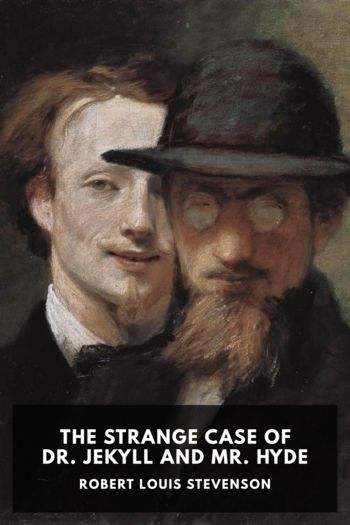The Strange Case of Dr. Jekyll and Mr. Hyde - Robert Louis Stevenson (people reading books TXT) 📗

- Author: Robert Louis Stevenson
Book online «The Strange Case of Dr. Jekyll and Mr. Hyde - Robert Louis Stevenson (people reading books TXT) 📗». Author Robert Louis Stevenson
“This is a sad business about Sir Danvers,” he said.
“Yes, sir, indeed. It has elicited a great deal of public feeling,” returned Guest. “The man, of course, was mad.”
“I should like to hear your views on that,” replied Utterson. “I have a document here in his handwriting; it is between ourselves, for I scarce know what to do about it; it is an ugly business at the best. But there it is; quite in your way: a murderer’s autograph.”
Guest’s eyes brightened, and he sat down at once and studied it with passion. “No sir,” he said: “not mad; but it is an odd hand.”
“And by all accounts a very odd writer,” added the lawyer.
Just then the servant entered with a note.
“Is that from Dr. Jekyll, sir?” inquired the clerk. “I thought I knew the writing. Anything private, Mr. Utterson?”
“Only an invitation to dinner. Why? Do you want to see it?”
“One moment. I thank you, sir;” and the clerk laid the two sheets of paper alongside and sedulously compared their contents. “Thank you, sir,” he said at last, returning both; “it’s a very interesting autograph.”
There was a pause, during which Mr. Utterson struggled with himself. “Why did you compare them, Guest?” he inquired suddenly.
“Well, sir,” returned the clerk, “there’s a rather singular resemblance; the two hands are in many points identical: only differently sloped.”
“Rather quaint,” said Utterson.
“It is, as you say, rather quaint,” returned Guest.
“I wouldn’t speak of this note, you know,” said the master.
“No, sir,” said the clerk. “I understand.”
But no sooner was Mr. Utterson alone that night, than he locked the note into his safe, where it reposed from that time forward. “What!” he thought. “Henry Jekyll forge for a murderer!” And his blood ran cold in his veins.
Incident of Dr. LanyonTime ran on; thousands of pounds were offered in reward, for the death of Sir Danvers was resented as a public injury; but Mr. Hyde had disappeared out of the ken of the police as though he had never existed. Much of his past was unearthed, indeed, and all disreputable: tales came out of the man’s cruelty, at once so callous and violent; of his vile life, of his strange associates, of the hatred that seemed to have surrounded his career; but of his present whereabouts, not a whisper. From the time he had left the house in Soho on the morning of the murder, he was simply blotted out; and gradually, as time drew on, Mr. Utterson began to recover from the hotness of his alarm, and to grow more at quiet with himself. The death of Sir Danvers was, to his way of thinking, more than paid for by the disappearance of Mr. Hyde. Now that that evil influence had been withdrawn, a new life began for Dr. Jekyll. He came out of his seclusion, renewed relations with his friends, became once more their familiar guest and entertainer; and whilst he had always been known for charities, he was now no less distinguished for religion. He was busy, he was much in the open air, he did good; his face seemed to open and brighten, as if with an inward consciousness of service; and for more than two months, the doctor was at peace.
On the 8th of January Utterson had dined at the doctor’s with a small party; Lanyon had been there; and the face of the host had looked from one to the other as in the old days when the trio were inseparable friends. On the 12th, and again on the 14th, the door was shut against the lawyer. “The doctor was confined to the house,” Poole said, “and saw no one.” On the 15th, he tried again, and was again refused; and having now been used for the last two months to see his friend almost daily, he found this return of solitude to weigh upon his spirits. The fifth night he had in Guest to dine with him; and the sixth he betook himself to Dr. Lanyon’s.
There at least he was not denied admittance; but when he came in, he was shocked at the change which had taken place in the doctor’s appearance. He had his death-warrant written legibly upon his face. The rosy man had grown pale; his flesh had fallen away; he was visibly balder and older; and yet it was not so much these tokens of a swift physical decay that arrested the lawyer’s notice, as a look in the eye and quality of manner that seemed to testify to some deep-seated terror of the mind. It was unlikely that the doctor should fear death; and yet that was what Utterson was tempted to suspect. “Yes,” he thought; “he is a doctor, he must know his own state and that his days are counted; and the knowledge is more than he can bear.” And yet when Utterson remarked on his ill-looks, it was with an air of great firmness that Lanyon declared himself a doomed man.
“I have had a shock,” he said, “and I shall never recover. It is a question of weeks. Well, life has been





Comments (0)